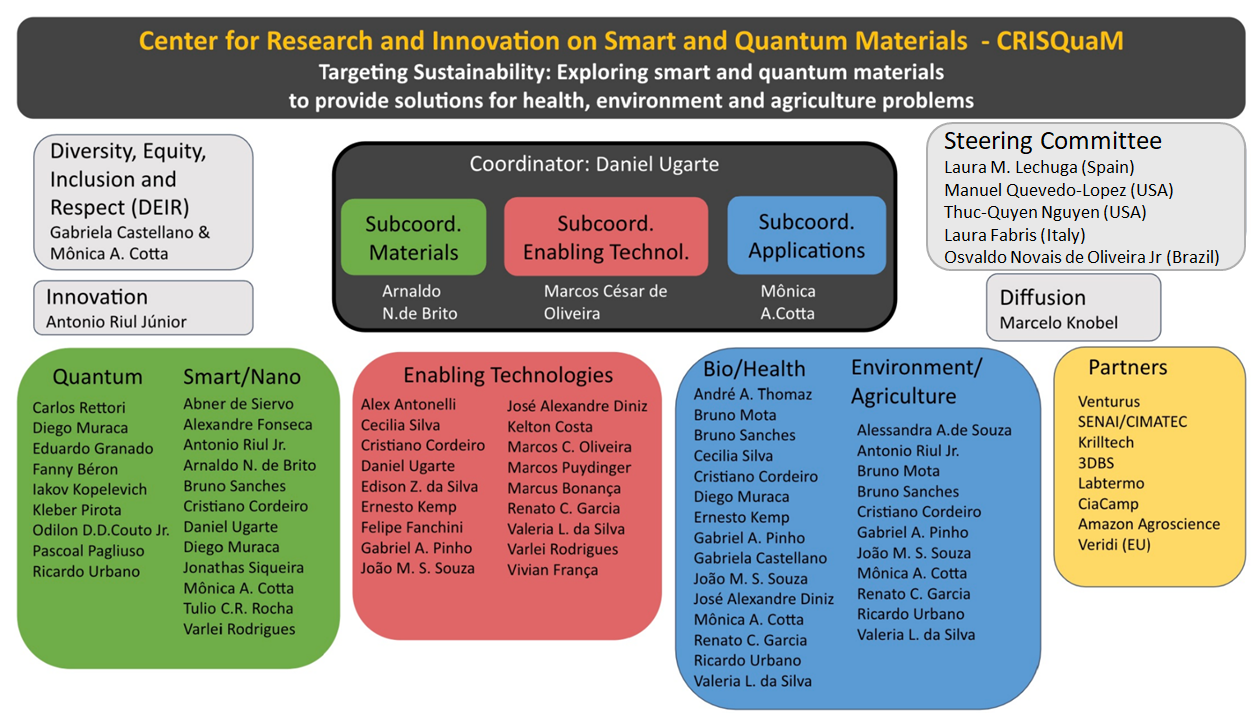BV-FAPESP: research projects supported in this Center
CRISQuaM in the Media: news about the center
CRISQuaM aims to explore the synergistic development of fundamental and applied science to create new materials with high potential for the construction of devices and sensors to address technological challenges related to sustainability, climate change, precision agriculture, ecology, and health. To achieve these goals, we have assembled an interdisciplinary and collaborative research team, integrating expertise across various scientific domains, researching novel materials with high innovation potential. By combining original synthesis methods, advanced characterization techniques, theoretical approaches, computational simulations, quantum technologies, and device construction designs, we aim to drive advances in smart and quantum materials, promoting scientific excellence and technological development. With this, we plan disruptive innovations in instrumentation—including hardware and AI-based tools—as well as in quantum technologies, biomedical devices, and signal processing, in addition to plant bionics, exploring plant-pathogen interactions. Besides research activities, we plan intensive actions in education, dissemination, and communication for the general public, as a modern society should be aware of the challenges humanity faces and how research and technology are essential for responsibly utilizing the planet's limited resources. CRISQuaM's Innovation activities are accelerated through partnerships with several companies in related technologies, many of them Brazilian. Finally, all activities of the Center are managed in accordance with diversity, equity, and inclusion goals and best practices.
The Center brings together scientists, engineers, and innovators in a collaborative effort to apply materials science and quantum technologies at the cutting edge, designing new materials and nano(bio)sensors for advanced diagnostics. The Center has a team capable of producing a wide range of (nano/micro) materials, along with precise chemical and physical characterizations using modern techniques (synchrotron, advanced microscopy, magnetotransport, magnetic resonance, optics, etc.). In addition, the team offers various options in enabling technologies, including miniaturization, processing, and additive manufacturing, as well as instrumentation, quantum sensing, and electronics development. Data analysis will employ updated approaches (numerical simulation, classical and quantum machine learning, and quantum optimization). Applications at the knowledge frontier will address urgent sustainability needs in environmental areas, precision agriculture, plant bionics, and biomedical interfaces, contributing to the development of local technologies in close partnership with the Brazilian industry.
The organization of the Center is based on three pillars — Materials, Enabling Technologies, and Applications — together with partner companies, as described in the figure below.

2025-07-08
Based on the analysis of the genotypes of 500 volunteers, the research project aims to develop a panel of prognostic biomarkers and differentiate Alzheimer’s disease from other types of dementia using blood tests.
2025-07-02
Researchers at a FAPESP-supported research center have combined innovative techniques to determine the chromosome number of species of the genus Vellozia, typical of this montane savannah ecoregion. The result provides support for conservation programs and biotechnological applications.
2025-07-02
In tests with rodents, researchers from the State University of Campinas and their collaborators found that hyperactivation of the PARP1 protein after exhaustive training was associated with decreased performance, fatigue, and behavioral symptoms of overtraining. Animals treated with a drug that inhibits the molecule’s activity did not exhibit the condition.
2025-07-02
FAPESP will begin supporting the Latin American Center for Medical Mycology, a global network of laboratories led by the University of Exeter in the United Kingdom, which also has a unit in South Africa and will soon open another in Asia. Over five years, the foundation will contribute approximately £ 750,000, while the British institution will invest an additional £ 1 million.
2025-07-02
Acetic acid, a component of vinegar, was used by researchers in the state of São Paulo to fractionate kraft lignin. The method produces nanoparticles with different properties, including UV protection.